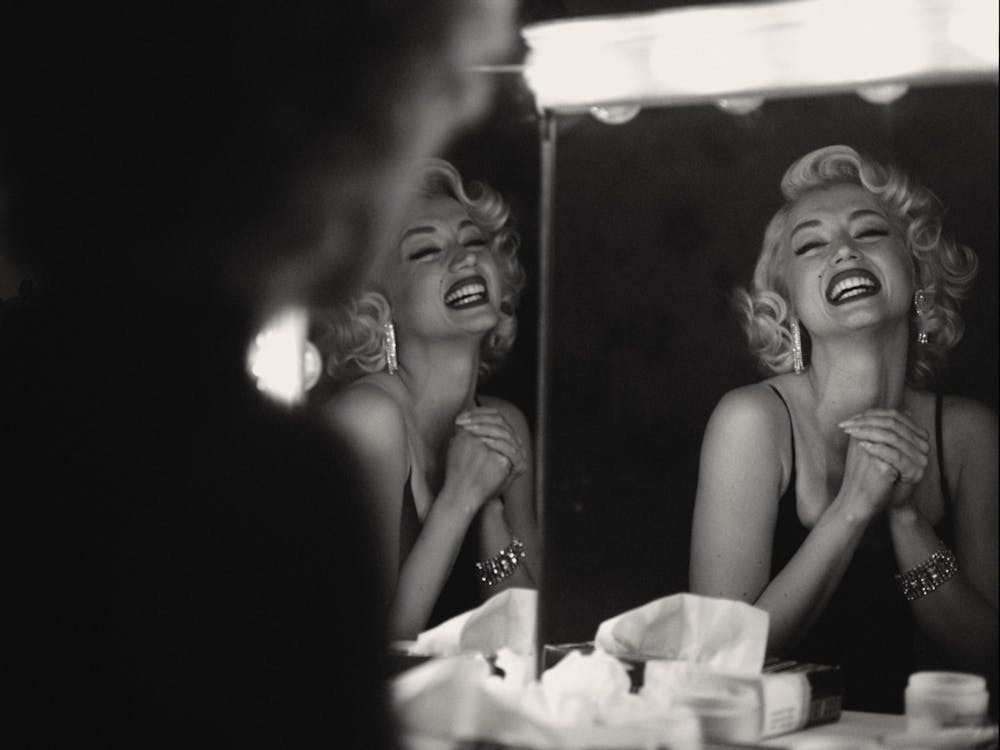SPOILER ALERT: This column contains potential spoilers about "Blonde.”
Andrew Dominik’s “Blonde,” a nearly three-hour long drama about Marilyn Monroe’s career and personal life, was released Sept. 28 on Netflix.
Visually, it’s a beautiful film. The cinematography and surreal, hazy atmosphere are mesmerizing. The score, done by Nick Cave and Warren Ellis, is haunting. Ana De Armas embodies Monroe with empathy.
That’s why the film’s writing and treatment of Monroe is so frustrating. The shell of a great film is there.
Related: [John Mellencamp to kick off 2023 tour at IU Auditorium]
Defenders of “Blonde” have been quick to tell those of us who found the film repulsive that it’s not a Marilyn Monroe biopic; it’s fiction. It’s a deeply feminist work about one of the most mystical figures in Hollywood history. They justify its portrayal of Monroe because “this film is not a safe space.”
It’s no surprise that most of the film’s supporters are men. The portrayal of Monroe allows them to dabble in the experience of female trauma and exploitation without having to carry the weight of it with them.
“Blonde” shows — and fabricates — some of the worst moments of Monroe’s life, never letting her be happy for more than five minutes. The camera objectifies her every time she’s in the frame — a deliberate but unsettling choice. In the film, she’s constantly grappling with her identity. She’s never allowed to simply exist as Norma Jean.
Even though Monroe had a difficult life, Dominik relentlessly torments her on screen. The alarming thing is that he undoubtedly wanted to do this from the beginning.
Overall, Dominik doesn’t shy away from the fact he seems to loathe Monroe. In an interview with Sight and Sound magazine when asked about his choice to omit some of Monroe’s accomplishments like starting her own production company and uplifting the career of Ella Fitzgerald, Dominik had this to say: “That stuff is not really what the film is about. It’s about a person who is going to be killing themself.”
Related: [Constellation Stage and Screen to begin fall theater and film classes this October]
The film also disgustingly portrays Monroe’s pregnancies. In one particularly horrendous scene, an aborted CGI fetus guilts Monroe about her current pregnancy. It’s shameful that such an insensitive scene was left in the final cut of the film, especially considering Monroe’s illegal abortions are entirely fictitious.
In a statement following the film’s release, Planned Parenthood said the organization “respects artistic license and freedom, however, false images only serve to reinforce misinformation and perpetuate stigma around sexual and reproductive health care.”
This complete disregard for the story of Monroe’s actual life proves Dominik only ever wanted to make her suffer. I’m not saying he shouldn’t have made a film about an artist’s self-destruction. Many directors have made beautifully complex films about tormented artists and public figures.
Take the films of Pablo Larraín. He directed “Spencer,” a harrowing drama about Princess Diana. In the film, we see Diana suffer. She’s tormented by society’s expectations of her and struggles to maintain her sense of self. The film has the same surreal, somewhat nightmarish style as “Blonde,” but “Spencer” doesn’t treat Diana like a helpless punching bag. She fights back against her oppressors and retains her autonomy.
"Spencer” is difficult to watch and even resembles a psychological horror film at times, but Larraín’s sympathy and care for Diana ensures that her trauma never becomes a spectacle. The same can be said about the way he portrays Jackie Kennedy in his 2016 drama “Jackie,” which chronicles her grief in the aftermath of John F. Kennedy’s assassination.
Dominik shouldn’t have touched Monroe’s legacy in the first place. If he was really so adamant about making a film that showcases a Hollywood starlet’s destruction, he should’ve committed to making a fictional film. Monroe was exploited enough while she was alive — she doesn’t need to be haunted after death too.
In “Blonde,” Dominik achieves what he set out to do. That doesn’t mean his intentions weren’t rotten in the first place.




